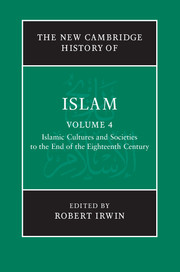Book contents
- Frontmatter
- Introduction
- PART I RELIGION AND LAW
- PART II SOCIETIES, POLITICS AND ECONOMICS
- PART III LITERATURE
- PART IV LEARNING, ARTS AND CULTURE
- 20 Education
- 21 Philosophy
- 22 The sciences in Islamic societies (750–1800)
- 23 Occult sciences and medicine
- 24 Literary and oral cultures
- 25 Islamic art and architecture
- 26 Music
- 27 Cookery
- Glossary
- Bibliography
- Index
- References
20 - Education
from PART IV - LEARNING, ARTS AND CULTURE
Published online by Cambridge University Press: 28 March 2011
- Frontmatter
- Introduction
- PART I RELIGION AND LAW
- PART II SOCIETIES, POLITICS AND ECONOMICS
- PART III LITERATURE
- PART IV LEARNING, ARTS AND CULTURE
- 20 Education
- 21 Philosophy
- 22 The sciences in Islamic societies (750–1800)
- 23 Occult sciences and medicine
- 24 Literary and oral cultures
- 25 Islamic art and architecture
- 26 Music
- 27 Cookery
- Glossary
- Bibliography
- Index
- References
Summary
The English term ‘knowledge’, Franz Rosenthal reminds us, does not fully convey the ‘factual and emotional’ weight of the Arabic ʿilm. ʿIlm, he continues, ‘is one of those concepts that have dominated Islam and given Muslim civilization its distinctive shape and complexion’. The central role of knowledge, of course, flows from the importance of making Islamic civilisation’s greatest treasures, the Qurʾān and the ḥadῑth (the reported sayings and doings of the Prophet Muḥammad), live and work in each day, each year and each generation of Muslim life. There is no part of Muslim life, Rosenthal continues, ‘that remained untouched by the all-pervasive attitude toward “knowledge” as something of supreme value for the Muslim being. ʿIlm is Islam even if the theologians have been hesitant to accept the technical correctness of this equation.’ Without knowledge there could be no salvation.
It was for this reason that the famous treatise on teaching and learning by the seventh/thirteenth-century scholar al-Zarnūjῑ made the pursuit of learning a requirement for all Muslims, male and female. They were to seek knowledge, moreover, as the oft-repeated tradition stated, ‘even if it be in China’. This was, furthermore, an activity that should consume them from the cradle to the grave, so al-Zarnūjῑ (d. 602/1223) tells the story of Muḥammad ibn al-Ḥasan (d. 179/795), who appeared to a believer in a dream to say that he had been so absorbed in thinking about the manumission of slaves that he had not noticed his own death.
- Type
- Chapter
- Information
- The New Cambridge History of Islam , pp. 495 - 531Publisher: Cambridge University PressPrint publication year: 2010

